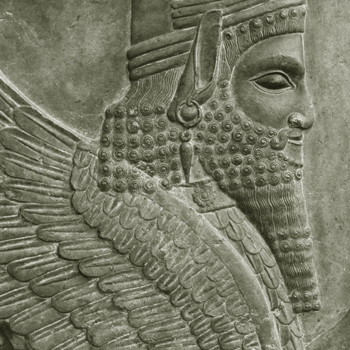 Religion, of course, has always played a powerful role in history and most religions manage to reveal profound aspects of P-A which, unfortunately, only a few of its followers ever understand. One such religion was Zoroastrianism in ancient Persia founded by Zarathustra; the date is uncertain, anywhere from 1000 to 600 B.C.E. The principle in question is that of the “Implicate Order” or source of Creation commonly called God today. The god of Zoroastrianism was Ahura-Mazda or the “Good Mind.” Ahura-Mazda was more like the Greek Logos as the ever-present agency of Creation. Unlike the Christian God who “created” and “went home,” Ahura-Mazda remained available to human beings to continue their part in the act of creation which was ongoing.
Religion, of course, has always played a powerful role in history and most religions manage to reveal profound aspects of P-A which, unfortunately, only a few of its followers ever understand. One such religion was Zoroastrianism in ancient Persia founded by Zarathustra; the date is uncertain, anywhere from 1000 to 600 B.C.E. The principle in question is that of the “Implicate Order” or source of Creation commonly called God today. The god of Zoroastrianism was Ahura-Mazda or the “Good Mind.” Ahura-Mazda was more like the Greek Logos as the ever-present agency of Creation. Unlike the Christian God who “created” and “went home,” Ahura-Mazda remained available to human beings to continue their part in the act of creation which was ongoing.
Human beings in this religion had both power and responsibility unknown in today’s modern religions—they were expected to be self-reliant and exercise free will. They were active agents of the creative process or, if you will, creators of their own story, their own reality. This should sound more than vaguely familiar!
“Human beings were not, to Zarathustra’s thinking, mere pawns in this cosmic war [between good and evil or true self and false self, if you will]; they had free will, since Ahura-Mazda wished them to be personalities in their own right; they might freely choose whether they would follow the Light or the Lie.” The “lie” remains the same today as it was then—the toxic and unsustainable story centered upon the false-self survival strategy—which of course has a metaphorical character. The Satan of Zoroastrianism was Ahriman who “was the Living Lie, and every liar was his servant … The soul of man, like the universe, was represented as a battleground of beneficent and maleficent spirits; every man was a warrior, whether he liked it or not, in the army of either the Lord or the Devil; every act or omission advanced the cause of Ahur-Mazda or of Ahriman.”
This was a religion that supported the possibility of human transformation and transcendence more than most of the religions that followed it throughout history. “All in all it was a splendid religion, less warlike and bloody, less idolatrous and superstitious, than the other religions of its time, and it did not deserve to die so soon.” Zoroastrianism believed in the possibility of Simple Reality. “It gave to the common life a dignity and significance grander than any that could come from a worldview that looked upon man (in medieval phrase) as a helpless worm or (in modern times) as a mechanical automaton.”
The worst sin in Zoroastrianism was unbelief. Unbelief was the equivalent of surrendering to the darkness, to Ahriman, to the false self. Such is our sin today. To believe in our own authentic power, to become self-reliant and to rely on our inner wisdom and our connection to the infinite possibilities of our connection to the “Good Mind” would be our victory over the Lie, and the return of the Light.
_______________________________________________________
References and notes are available for this essay.
Find a much more in-depth discussion in the Simple Reality books:
Where Am I? Story – The First Great Question
Who Am I? Identity – The Second Great Question
Why Am I Here? Behavior – The Third Great Question
Science & Philosophy: The Failure of Reason in the Human Community


